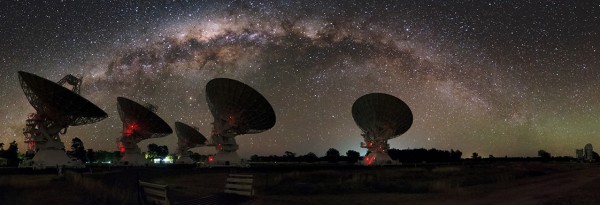By Ana Verayo, | January 22, 2016

The Australia Telescope Compact Array are radio telescopes designed to detect alien signals. (CSIRO)
Ever wonder why aliens have not yet made contact with Earth? Astrobiologists believe that the most logical reason is that life on distant planets could be short lived and can unfortunately become extinct quickly.
In a new research by scientists from the Australian National University, researchers investigated how life could develop in exoplanets, where they concluded that new life would normally die out from runaway heating or cooling on their young planets.
Like Us on Facebook
According to Aditya Chopra from the Australian National University, the universe is most likely filled with many inhabitable planets where many scientists believe that they should be teeming with alien life. Chopra adds how early life can be so fragile, which means that it rarely evolves quickly enough to sustain survival.
Early planetary habitats and environments are more unstable than not, and in order to produce a habitable planet, life forms should be able to generate and then regulate their greenhouse gases from water to carbon dioxide in order to maintain surface temperatures in stable conditions.
Some four billion years ago, Earth along with Venus and Mars were more or less habitable planets however after a billion years within formation, Venus transformed into hot, swarming planet and Mars shriveled up into an icy one.
According to Charley Lineweaver from the Australian National University, if there ever were microbial life on Venus and Mars, it failed to adapt and then become stable to the fast changing environment in these worlds. He adds that life on Earth played a crucial role in the stabilization of the planet's overall climate.
The team believes that their theory is the answer to this longstanding mystery, of why intelligent extraterrestrial life still have not yet reached Earth.
Chopra says that the reason why there are still no signs of aliens has nothing to do with the probability of their origin life and intelligence but more so depends on the extremely rare chances of rapid biological evolution to regulate feedback cycles on planetary surfaces.
Rocky planets with flowing water and energy resources that are essential for life may seem omnipresent in the universe however, there are still no signs of surviving extra terrestrial life that has been found, according to Enrico Fermi in 1950.
This is known as Fermi's paradox, where researchers believe of a near universal early extinction event, calling it the Gaian Bottleneck model. This model reveals that majority of the fossilized remains in the universe are from already extinct microbial life, and not multicellular species such as dinosaurs or humanoids that need a billion years to evolve, according to Lineweaver.
-
Use of Coronavirus Pandemic Drones Raises Privacy Concerns: Drones Spread Fear, Local Officials Say

-
Coronavirus Hampers The Delivery Of Lockheed Martin F-35 Stealth Fighters For 2020

-
Instagram Speeds Up Plans to Add Account Memorialization Feature Due to COVID-19 Deaths

-
NASA: Perseverance Plans to Bring 'Mars Rock' to Earth in 2031

-
600 Dead And 3,000 In The Hospital as Iranians Believed Drinking High-Concentrations of Alcohol Can Cure The Coronavirus

-
600 Dead And 3,000 In The Hospital as Iranians Believed Drinking High-Concentrations of Alcohol Can Cure The Coronavirus

-
COVID-19: Doctors, Nurses Use Virtual Reality to Learn New Skills in Treating Coronavirus Patients







